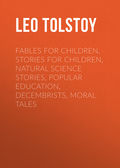
Лев Толстой
The Live Corpse
ACT V
Scene 1
A dirty room in a low-class restaurant. A table, at which people sit drinking tea and vódka. In the foreground a small table, at which sits Fédya, tattered, and much come down in the world. With him is Petushkóv, a gentle, mild man with long hair, of clerical appearance. Both are slightly drunk.
PETUSHKÓV. I understand, I understand. That is true love! Yes? Go on.
FÉDYA. Well, you know, if a woman of our class showed such feeling and sacrificed everything for the man she loved… But she was a gipsy, brought up to money-hunting, and yet she had this self-sacrificing love! Gave everything, and wanted nothing herself! The contrast was so wonderful!
PETUSHKÓV. Yes, in art we call it “value.” You can only get quite bright red by putting green round it. But that's not to the point. I understand, quite understand.
FÉDYA. Yes, and I believe the one good action of my life is that I never took advantage of her love. And do you know why?
PETUSHKÓV. Pity.
FÉDYA. Oh no! I never felt pity for her. What I felt for her was always rapturous admiration – and when she sang! Ah, how she sang – and perhaps still sings! I always regarded her as far above me. I did not ruin her, simply because I loved her; loved her truly. And now she's a good, happy memory! [Drinks].
PETUSHKÓV. Yes, I understand, I understand. It's ideal.
FÉDYA. I'll tell you something. I have had my passions, and once I was in love with a lady – very handsome – and I loved her nastily, like a dog. She gave me a rendezvous. And I did not go, because I thought it was treating the husband shabbily. And it is strange that, even now, when I remember it I want to feel pleased and to approve of myself for having acted honourably, but I always repent as if I had committed a sin! But in the case of Másha, on the contrary, I am always pleased – pleased that I did not pollute that feeling of mine… I may fall lower still, sell all I have on me, be covered with lice and sores – but this jewel … no, not jewel, but ray of sunshine, is still with me and in me.
PETUSHKÓV. I understand, I understand! And where is she now?
FÉDYA. I don't know! And I'd rather not know. All that belonged to a different life; and I don't want to mix it up with this…
A woman is heard screaming at a table behind. The manager and a policeman come in and take her out. Fédya and Petushkóv listen, and look on in silence. When all is quiet again,
PETUSHKÓV. Yes, your life is astonishing.
FÉDYA. No, it's most simple! You know, in the society in which I was born there are only three careers open to a man – only three. The first is to enter the civil or military service, to earn money and increase the abominations amid which we live. That was repulsive to me. Perhaps I had not the capacity for it; but above all it repelled me. Then the second is to destroy those abominations. To do that you must be a hero; and I am not a hero. And the third is to forget it all by going on the spree, drinking and singing. That is what I did. And this is what my singing has brought me to! [Drinks].
PETUSHKÓV. And what about family life? I should be happy if I had a wife. My wife ruined me.
FÉDYA. Family life? Yes, my wife was an ideal woman. She is still living. But how shall I tell you? There was no yeast in it – you know, the yeast that makes the beer froth! Well, there was nothing of that in our life: it was flat, and I wanted something to help me to forget – and one can't forget when there's no sparkle in life. Then I began to do all sorts of nasty things. And you know, we love people for the good we do them, and dislike them for the harm we do them; and I did her much harm. She seemed to love me …
PETUSHKÓV. Why do you say “seemed”?
FÉDYA. I say it because there was never anything about her that made her creep into my soul as Másha did. But that's not what I meant to say. When she was pregnant, or nursing her baby, I used to vanish, and come home drunk; and of course, just because of that, I loved her less and less. Yes, yes! [in ecstasy] I have it! The reason I love Másha is that I did her good and not harm. That's why I love her. The other one I tormented, and therefore I don't like her… No, after all, I simply don't like her! Was I jealous? Yes, but that too is past…
Enter Artémyev, with a cockade on his cap, dyed moustaches, and old renovated clothes.
ARTÉMYEV. Wish you a good appetite! [Bows to Fédya] I see you've made acquaintance with our painter, our artist.
FÉDYA [coldly] Yes, we are acquainted.
ARTÉMYEV [to Petushkóv] And have you finished the portrait?
PETUSHKÓV. No, I lost the order.
ARTÉMYEV [Sits down] I'm not in your way?
Fédya and Petushkóv do not answer.
PETUSHKÓV. Theodore Vasílyevich was telling me about his life.
ARTÉMYEV. Secrets? Then I won't disturb you – go on? I'm sure I don't want you. Swine! [Goes to next table and calls for beer. He listens all the time to Fédya's conversation with Petushkóv, and leans towards them without their noticing
FÉDYA. I don't like that gentleman.
PETUSHKÓV. He was offended.
FÉDYA. Well, let him be! I can't stand him. He is such a fellow, my words won't come when he is there. Now with you I feel at ease, and comfortable. Well, what was I saying?
PETUSHKÓV. You were speaking about your jealousy. And how was it you parted from your wife?
FÉDYA. Ah! [Pauses and considers] It's a curious story. My wife is married …
PETUSHKÓV. How's that? Are you divorced?
FÉDYA [smiles] No, I left her a widow.
PETUSHKÓV. What do you mean?
FÉDYA. I mean that she's a widow! I don't exist.
PETUSHKÓV. Don't exist?
FÉDYA. No, I'm a corpse! Yes … [Artémyev leans over, listening] Well, you see – I can tell you about it; and besides, it happened long ago; and you don't know my real name. It was this way. When I had tired out my wife and had squandered everything I could lay my hands on, and had become unbearable, a protector turned up for her. Don't imagine that there was anything dirty or bad about it – no, he was my friend and a very good fellow – only in everything my exact opposite! And as there is far more evil than good in me, it follows that he was a good – a very good man: honourable, firm, self-restrained and, in a word, virtuous. He had known my wife from her childhood, and loved her. When she married me he resigned himself to his fate. But later, when I became horrid and tormented her, he began to come oftener to our house. I myself wished it. They fell in love with one another, and meanwhile I went altogether to the bad, and abandoned my wife of my own accord. And besides, there was Másha. I myself advised them to marry. They did not want to, but I became more and more impossible, and it ended in …
PETUSHKÓV. The usual thing?
FÉDYA. No. I am sure; I know for certain that they remained pure. He is a religious man, and considers marriage without the Church's blessing a sin. So they began asking me to agree to a divorce. I should have had to take the blame on myself. It would have been necessary to tell all sorts of lies … and I couldn't! Believe me, it would have been easier for me to take my life than to tell such lies – and I wished to do so. But then a kind friend came and said, “Why do it?” and arranged it all for me. I wrote a farewell letter, and next day my clothes, pocket-book and letters were found on the river bank. I can't swim.
PETUSHKÓV. Yes, but how about the body? They did not find that!
FÉDYA. They did! Fancy! A week later somebody's body was found. My wife was called to identify the decomposing body. She just glanced at it. “Is it he?” “It is.” And so it was left. I was buried, and they married and are living in this town, happily. And I – here I am, living and drinking! Yesterday I passed their house. The windows were lit up, and someone's shadow crossed the blind. Sometimes it's horrid, and sometimes not. It's horrid when I've no money … [Drinks].
ARTÉMYEV [approaches] Excuse me, but I heard your story. It's a very good story, and more than that – a very useful one! You say it's horrid when one has no money? There's nothing more horrid. But you, in your position, should always have money. Aren't you a corpse? Well then …
FÉDYA. Excuse me! I did not speak to you and don't want your advice.
ARTÉMYEV. But I want to give it! You are a corpse; but suppose you come to life again? Then they, your wife and that gentleman, who are so happy – they would be bigamists, and at best would be sent to the less distant parts of Siberia. So why should you lack money?
FÉDYA. I beg you to leave me alone.
ARTÉMYEV. Simply write a letter. I'll write it for you if you like; only give me their address, and you'll be grateful to me.
FÉDYA. Be off, I tell you! I have told you nothing!
ARTÉMYEV. Yes, you have! Here's my witness. The waiter heard you say you were a corpse.
WAITER. I know nothing about it.
FÉDYA. You scoundrel!
ARTÉMYEV. Am I a scoundrel? Eh, police! I'll give him in charge!
Fédya rises to go, but Artémyev holds him. Enter policeman.
Curtain
Scene 2
The ivy-covered verandah of a bungalow in the country. Anna Dmítrievna Karénina. Lisa (pregnant), nurse, and boy.
LISA. Now he's on his way from the station.
BOY. Who is?
LISA. Papa.
BOY. Papa's coming from the station?
LISA.C'est étonnant comme il l'aime, tout-à-fait comme son père.23
ANNA DMÍTRIEVNA.Tant mieux! Se souvient-il de son père véritable?24
LISA [sighs] I never speak to him about it. I say to myself, “Why confuse him?” Sometimes I think I ought to tell him. What is your opinion, Maman?
ANNA DMÍTRIEVNA. I think it is a matter of feeling, Lisa, and if you obey your feelings your heart will tell you what to say and when to say it. What a wonderful conciliator death is! I confess there was a time when Fédya – whom I had known from a child – was repulsive to me; but now I only remember him as that nice lad, Victor's friend, and as the passionate man who sacrificed himself – illegally and irreligiously, but still sacrificed himself – for those he loved. On aura beau dire, l'action est belle.25… I hope Victor will not forget to bring the wool: I've hardly any left. [Knits].
LISA. I hear him coming.
The sound of wheels and bells is heard. Lisa rises, and goes to the edge of the veranda.
LISA. There's someone with him, a lady in a bonnet – It's Mother! I have not seen her for an age. [Goes to the door].
Enter Karénin and Anna Pávlovna.
ANNA PÁVLOVNA [kisses Lisa and Anna Dmítrievna] Victor met me, and has brought me here.
ANNA DMÍTRIEVNA. He has done well.
ANNA PÁVLOVNA. Yes, certainly. I thought to myself, “When shall I see her again?” and kept putting it off. But now I've come, and if you don't turn me out I will stay till the last train.
KARÉNIN [kisses his wife, mother, and the boy] D'you know what a piece of luck! Congratulate me – I have two days' holiday. They'll be able to get on without me to-morrow.
LISA. Splendid! Two days! It's long since we had that! We'll drive to the Hermitage, shall we?
ANNA PÁVLOVNA. What a likeness! Isn't he a strapping fellow? If only he has not inherited everything – his father's heart …
ANNA DMÍTRIEVNA. But not his weakness.
LISA. No, everything! Victor agrees with me that if only he had been rightly guided in childhood …
ANNA PÁVLOVNA. Well, I don't know about that; but I simply can't think of him without tears.
LISA. No more can we. How much higher he stands now in our recollection!
ANNA PÁVLOVNA. Yes, I am sure of it.
LISA. How it all seemed insoluble at one time – and then everything suddenly came right.
ANNA DMÍTRIEVNA. Well, Victor, did you get the wool?
KARÉNIN. Yes, I did. [Brings a bag, and takes out parcels]. Here is the wool, and this is the eau-de-Cologne; and here are letters – one “On Government Service” for you, Lisa [hands her a letter]. Well Anna Pávlovna, if you want to wash your hands I will show you your room. I must make myself tidy too; it is almost dinner time. Lisa, Anna Pávlovna's room is the corner one downstairs, isn't it?
Lisa is pale; holds the letter in trembling hands, and reads it.
KARÉNIN. What's the matter? Lisa, what is it?
LISA. He is alive!.. Oh God! When will he release me! Victor, what does this mean? [Sobs].
KARÉNIN [Takes letter and reads] This is dreadful!
ANNA DMÍTRIEVNA. What is it? Why don't you tell me?
KARÉNIN. It is dreadful! He's alive, she's a bigamist, and I a criminal! It's a notice from the Examining Magistrate – a summons for Lisa to appear before him.
ANNA DMÍTRIEVNA. What a dreadful man! Why has he done this?
KARÉNIN. All lies, lies!
LISA. Oh, how I hate him! I don't know what I am saying … [Exit in tears. Karénin follows her].
ANNA PÁVLOVNA. How is it he's alive?
ANNA DMÍTRIEVNA. All I know is, that as soon as Victor came in contact with this world of mud – they were sure to draw him in too! And so they have. It's all fraud – all lies!





